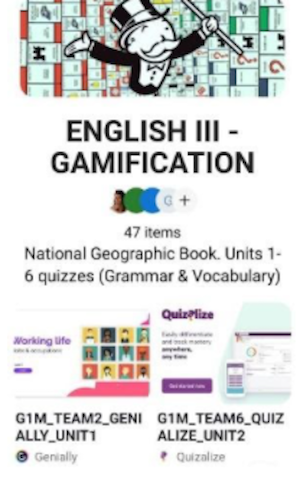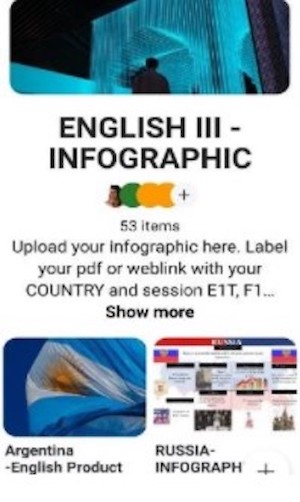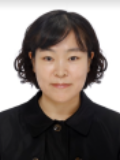|
In this column, I want to introduce you to four members who are current or past CALL-IS steering committee members:
- Olenka Villavicencio Carranza
- Minsun Kim
- Jane Chien
- Georgios Kormpas
For each newsletter, I invite members to answer a set of questions:
- What is your favorite platform?
- What is the one indispensable tool/webpage?
- What is your most unexpected source of information about CALL?
- What was your favorite CALL creation?
- What are you working on now?
- What area would you like to see developed/researched?
- In a sentence, what advice would you give to a newbie starting out in CALL?
I hope you enjoy this opportunity to make CALL connections with our members as they share their experiences, advice, and inspirations. Please e-mail me at suzanstamper@gmail.com if you have suggestions or contributions to Making Connections.
 Olenka Villavicencio is an Instructional Technology Specialist and an ESL professor at San Ignacio de Loyola University, Lima, Peru. In addition, she is a TESOL CALL-IS steering committee member-at-large 2021-2022, IATEFL Peru LT SIG Representative, and an academic and IT freelance consultant. She holds degrees in education, computer sciences, and in education management. In addition to teaching, she is keen on sharing her expertise at national and international ELT conferences in the USA, France, Mexico, Honduras, Panama, Santo Domingo, Brazil, Colombia, Paraguay, Ecuador, and Mexico. Olenka Villavicencio is an Instructional Technology Specialist and an ESL professor at San Ignacio de Loyola University, Lima, Peru. In addition, she is a TESOL CALL-IS steering committee member-at-large 2021-2022, IATEFL Peru LT SIG Representative, and an academic and IT freelance consultant. She holds degrees in education, computer sciences, and in education management. In addition to teaching, she is keen on sharing her expertise at national and international ELT conferences in the USA, France, Mexico, Honduras, Panama, Santo Domingo, Brazil, Colombia, Paraguay, Ecuador, and Mexico.
Email: olenkavillavicencioelt@gmail.com
Years in the CALL-IS: 1 year
Q. What is your favorite platform?
A. Zoom is one of my favorite platforms because it is very practical, easy to use. It can also stream your webinars on Facebook, and has reliable connectivity.
Q. For you, what is the one indispensable tool/web page?
A. There are plenty of great tools and webpages to use. However, it depends on your students’ interests, time, age, preparation, and contexts. For me, online collaboration tasks and tools are a must, and it is essential to use them at different levels. The facilitator can adapt the tasks with good practices easily. Here are some examples: Padlet, Nearpod, Google Slides, Google Jamboard, Miro, and Linoit. Some practical websites are https://www.bbc.co.uk/learningenglish/ and https://www.tesol.org/
Q. What is your most unexpected source of information about CALL?
A. The first time that I sent my proposal to Electronic Village 2021, and it was accepted. Also, I participated in an EFL-IS & CALL-IS Intersection Session that was absolutely amazing. I met fantastic new teachers who have the same passion for technology as me.
Q. What was your favorite CALL creation?
A. I have different CALL creations. I adore when my students create online material such as quizzes, infographics, presentations, games, and collaborations through Wakelet. It is a web-based bookmarking site and allows you to make collections and collaborate with students and colleagues. You can visit it at https://wakelet.com/@olenkavillavicencioELT
Here are examples from my class.


Additionally, I create dynamic online material through Genially. You can make infographics, slides, escape rooms, games, and more.
Q. What are you working on now?
A. I currently teach undergraduate and graduate students at San Ignacio de Loyola University in Lima, Peru. Moreover, I work as an academic and IT freelance consultant.
Q. What area would you like to see developed/researched?
A. Digital competences for teachers and students, gamification, and virtual Reality.
Q. In a sentence, what advice would you give to a newbie starting out in CALL?
A. Participate in different online webinars as attendees and then as speakers, register for free online or paid courses, travel to different conferences around the world, increase your Professional Learning Network (PLN), and be involved in a teaching association such as TESOL International, IATEFL or others. Don’t be afraid. Go the extra mile and challenge yourself every year.
 Minsun Kim holds a PhD in English from Purdue University and is a lecturer at Purdue Language and Cultural Exchange (PLaCE), Purdue University, West Lafayette, Indiana, USA. She has taught second language learners for more than 10 years at Purdue and Miami University, Ohio. Minsun has been involved with TESOL’s CALL-IS for many years as an Electronic Village presenter, newsletter contributor, and steering committee member. Minsun Kim holds a PhD in English from Purdue University and is a lecturer at Purdue Language and Cultural Exchange (PLaCE), Purdue University, West Lafayette, Indiana, USA. She has taught second language learners for more than 10 years at Purdue and Miami University, Ohio. Minsun has been involved with TESOL’s CALL-IS for many years as an Electronic Village presenter, newsletter contributor, and steering committee member.
Email: kim53@purdue.edu
Years in the CALL-IS: approximately 6 years
Q. What is your favorite platform?
A. Since 2019, I have used Flipgrid as an online learning space where students collaborate and learn together.
Q. For you, what is the one indispensable tool/web page?
A. For flexible teaching during the COVID-19 pandemic, I have used Brightspace to create custom content for my students in in-person, virtual, and hybrid classrooms.
Q. What is your most unexpected source of information about CALL?
A. I have been a regular attendee at TESOL’s annual conventions and found many useful strategies or tools in non-CALL-related sessions.
Q. What was your favorite CALL creation?
A. I published two articles in the past CALL-IS Newsletters about the uses of web-based reference managers and Flipgrid as pedagogical tools.
Q. What are you working on now?
A. I am now working on my presentation at the TESOL 2022 Electronic Village, which will take place in March. I will demonstrate different ways to incorporate peer review to asynchronous virtual instruction with online tools, including Purdue’s Circuit, Peer Studio, and PeerMark by Turnitin.
Q. What area would you like to see developed/researched?
A. Education through the uncertainty of the COVID-19 pandemic calls for more adaptable and flexible teaching and learning modalities. It is important to research and apply modern technology from different fields to optimize student learning and engagement.
Q. In a sentence, what advice would you give to a newbie starting out in CALL?
A. Try to utilize campus resources for faculty to help improve your “contextualized” instructional technology skills in CALL.
 Jane Chien is an assistant professor in the Department of Children’s English Education at National Taipei University of Education. Her most valuable experience actively participating in the international CALL community has been serving on the TESOL’s CALL-IS Electronic Village Online coordination team since 2018, joining the steering committee of CALL-IS Member-at-large, serving as a volunteer coordinator in 2020, and serving as the CALL-IS Chair-Elect in 2021. Jane Chien is an assistant professor in the Department of Children’s English Education at National Taipei University of Education. Her most valuable experience actively participating in the international CALL community has been serving on the TESOL’s CALL-IS Electronic Village Online coordination team since 2018, joining the steering committee of CALL-IS Member-at-large, serving as a volunteer coordinator in 2020, and serving as the CALL-IS Chair-Elect in 2021.
Email: ychien@gmail.com or ychien@mail.ntue.edu.tw
Years in the CALL-IS: 13
Q. What is your favorite platform?
A. G Suite (now Google Workplace). I enjoy viewing what each student is doing live on Google Docs and know how they contributed.
Q. For you, what is the one indispensable tool/web page?
A. Genial.ly, where I create most of my presentations.
Q. What is your most unexpected source of information about CALL?
A. My students, especially the apps they use that can be adopted for language learning purposes.
Q. What was your favorite CALL creation?
A. EVO Minecraft world. Each year a new area is developed for TESOL educators to build communities and interact live via Discord, brainstorming ways to engage learners in interactions in virtual worlds.
Q. What are you working on now?
A. I am moderating the EVO Minecraft MOOC 2022 session with Vance Stevens and our moderating team, but also participating in two other sessions: “Delivering best practices for distance and blended courses” offered by Christine Bauer-Ramazani and several past CALL-IS chairs, and “Ludic Language Pedagogy: How to teach with any game in your language classroom” by James York.
Q. What area would you like to see developed/researched?
A. Research on cognitive discourse functions for conceptualizing gameplay and language learning through gaming in the virtual worlds.
Q. In a sentence, what advice would you give to a newbie starting out in CALL?
A. Join a community of practice, or the annual Electronic Village Online, where you can meet educators offering inspiring and yet practical advice.
 Georgios Kormpas is the Director of Teaching at Al Yamamah University, Chair of the Nominating Committee at TESOL International and President of the International Association for Blended Learning, and a PhD Researcher at Lancaster University, e-Research and Technology Enhanced Learning. Georgios is also a long time CALL-IS member and steering committee member 2017 – 2020. Georgios Kormpas is the Director of Teaching at Al Yamamah University, Chair of the Nominating Committee at TESOL International and President of the International Association for Blended Learning, and a PhD Researcher at Lancaster University, e-Research and Technology Enhanced Learning. Georgios is also a long time CALL-IS member and steering committee member 2017 – 2020.
e-mail: georgekormpas@gmail.com
Years in the CALL-IS: 8
Q. What is your favorite platform?
A. Zoom has grown to become my favorite platform. I first used it almost 5-6 years ago while I was driving to a meeting. Even though I thought it was not a good tool to use, I used it because it was not banned in the Middle East. It has developed greatly in the past two years; it is an indispensable tool for my work and social life now.
Q. For you, what is the one indispensable tool/web page?
A. I really like Vance Steven’s page https://learning2gether.net/ - so many great ideas and videos about pretty much everything! A great “thank you” to Vance!
Q. What is your most unexpected source of information about CALL?
A. WIRED magazine. I find it very creative and inspirational. I read both the US and UK versions, and lately the Middle East one as well.
Q. What was your favorite CALL creation?
A. I will say a CALL – IS creation that I really like: The Electronic Village. It has given me great opportunities, and a lot of people from around the world can present hands-on ideas.
Q. What are you working on now?
A. I am working on my PhD dissertation that talks about how technology affected English Language Teacher Associations and how they transformed their face-to-face PD to online.
Q. What area would you like to see developed/researched?
A. Digital literacies and low-tech solutions for areas and people who do not have access to advanced technology or fast internet.
Q. In a sentence, what advice would you give to a newbie starting out in CALL?
A. It’s a great place to be! Try new ideas and do not be afraid to make mistakes with technology.
Q. What is your funniest CALL-related incident?
A. Not a lot of people know my first degree was in Computer Engineering. Once, when I was doing a training session on listening and speaking, a computer broke down. I opened it and fixed it. It was hilarious to see fellow teachers’ faces as I went from presenting 5 minutes before to fixing a computer!
Suzan Stamper is a lecturer in the Center for Language Education at the Hong Kong University of Science and Technology. She has been a CALL-IS and TESOL member since 1995. | 
